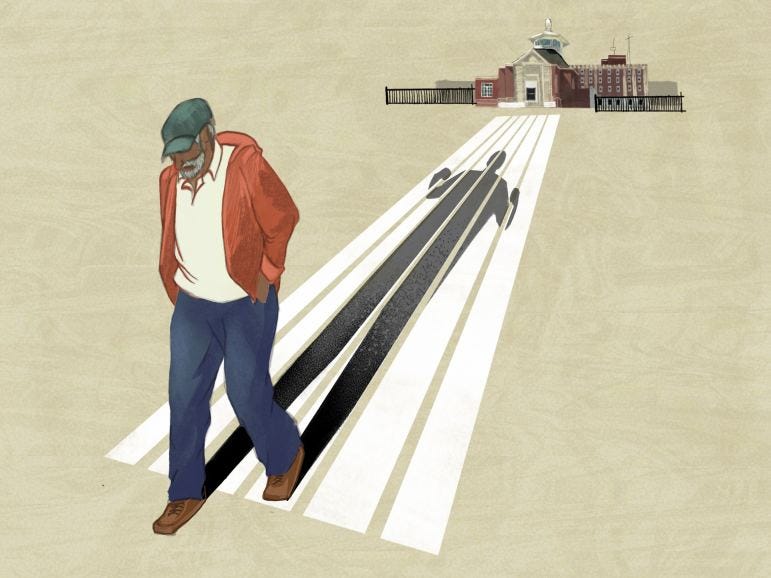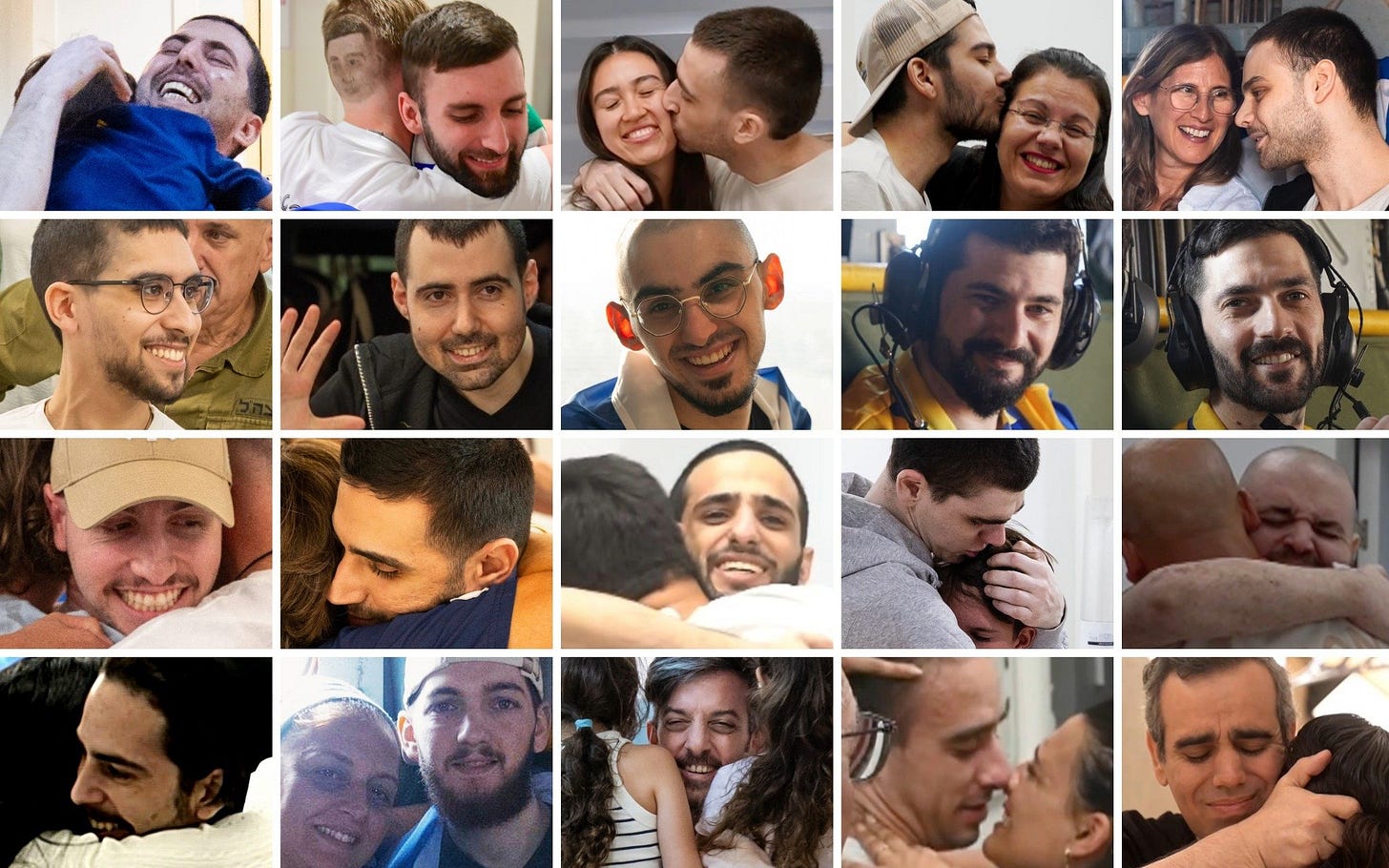Return
to a familiar place we've never been before
What a privilege to be alive to bear witness to moments of redemption — glimmers of the ultimate peace that humanity is destined for and longs to see, hear, smell, taste and feel — whether we can articulate our desire for it or not.
May we all live long healthy lives to bear witness to the ultimate redemption and may it come soon.

As I finished the last of seven laps around my synagogue Monday morning with lulav and etrog in hand, elated from the news that the 20 living hostages had actually been returned intact to Israel, I read this prophetic verse from Isaiah that was referenced in the final lines of the prayer unique to that day:
Isaiah 51:11
וּפְדוּיֵי ה׳ יְשׁוּבוּן וּבָאוּ צִיּוֹן בְּרִנָּה וְשִׂמְחַת עוֹלָם עַל־רֹאשָׁם שָׂשׂוֹן וְשִׂמְחָה יַשִּׂיגוּן נָסוּ יָגוֹן וַאֲנָחָה׃ֿ
The Lord’s redeemed shall return, and come singing to Zion, and everlasting joy shall be upon their heads. They shall attain gladness and joy, while sorrow and sighing shall flee away.
It’s not lost any Jew who is aware of the Jewish calendar that the last living hostages in Gaza were returned to safety two years later, to the day, from the day of their brutal capture and abduction. They were taken from their homes and from their dancing on the holiday of Shmini Atseret/Simchat Torah 5784, and they were brought back to Israeli soil this past Monday, Hoshana Rabbah 5786, which led straight into Shmini Atseret/Simchat Torah 5786 that night at sundown.
In addition, let it not be lost on anyone that the literal meaning of Hoshana Rabbah (הושענא רבה) is none other than “Great Salvation.”
And yet — on that radiant day, I found a dark question lurking in the back of my mind. It’s an uncomfortable question, but one I believe must be asked — because if we don’t, it will no doubt fester in the shadows of our psyches:
These 20 remaining living hostages are back to safety, but are not back to normal. They have come back with unimaginable wounds from what they’ve endured, which will undoubtedly will leave scars on them and all those around them.
251 people were taken hostage on October 7, 2023. Those that were thankfully returned — by the grace of God and the courage and sacrifice of the soldiers of the IDF — will similarly bear their burdens, each in their own way, probably forever.
92 of the 251 hostages were murdered while captive in Gaza.
As of this writing, Hamas has only returned 7 of the 28 deceased hostages whom they committed to returning in the deal signed last week. One of the bodies they returned was confirmed by Israeli forensics to be the body of a Gazan.
1,195 people were murdered on October 7th itself.
915 IDF soldiers have fallen in this war. The IDF have identified over 6,500 bereaved family members who have lost loved ones in this war, and this is just the closest circle of people mourning those lost in battle.
3,830 soldiers have been lightly wounded in battle, 1,557 moderately wounded, and 946 severely wounded. May they all see complete recoveries.
Earlier this week, another Nova survivor took his life. His pain, he wrote in a note to his friends and family, was too great to bear. May Hashem bring consolation and healing to all of those suffering from what they’ve experienced.
The country is exhausted from the two years of war — the word “exhausted,” I’m told by those who live in Israel, just barely captures the feeling of tension, strain on marriages and families, tiredness, seemingly endless calls into the reserves, hearing sad news, and enormous economic strain.
Gaza is in ruins. Tens of thousands of non-combatants have lost their lives. Millions of Palestinians have been left living in misery.
Here’s my question — maybe it’s yours too:
How can we truly celebrate the return of these 20 hostages with so much destruction wrought? It’s not even a return to things as they were on October 6, 2023… The word “return” makes it sound like things went back to where they came from, but they didn’t. Everything is different. We, of course, should be grateful and relieved, but can we celebrate in good conscience?
We, of course, should be grateful and relieved, but can we celebrate in good conscience?
Here’s a utilitarian way to answer this question and put our minds at ease.
We could claim that things are objectively better after the war than they were before the war:
We are no longer naive to the threat of Hamas and the vulnerabilities in Israel’s border security. The Israeli security apparatus has a much better grasp on how to secure Gaza as well as Judaea and Samaria.
Hamas’s leadership and fighters have been decimated.
October 7th provided the critical opportunities to obliterate Hezbollah, which was far more formidable than Hamas. It similarly allowed Israel to take decisive actions against the Houthis, and of course, deal historic blows to Iran’s nuclear program and weaken its regime that was the proverbial “head of the octopus” of global terror.
These points can be made, are made by many, and ought to be made, but they do not satisfy, at least for me, the depths of our question. They feel like emotionally detached rationalizations akin to chalking up the devastation of the Holocaust as a necessary tragedy to allow for the establishment of the State of Israel. They may satisfy some people’s minds, but not their souls.
I want to propose a perspective that isn’t entirely rational, but does resonate with me more deeply.
Throughout Biblical and Rabbinic literature, redemption weaves together two threads that most of us would not have intuitively connected:
teshuva (“repentance”) and
the return from captivity.
Here’s a notable example:
Devrarim 30:1-3:
And it shall come to pass, when all these things are come upon you, the blessing and the curse, which I have set before thee, and you will take to heart (וַהֲשֵׁבֹתָ) among all the nations, into which Hashem your God has driven you, and you will return (וְשַׁבְתָּ) to Hashem your God, and will listen to His voice according to all that I command you this day, you and your children, with all thy heart, and with all your soul; that then, Hashem your God will return (וְשָׁב) your captives (שְׁבוּתְךָ), and have compassion upon you, and will return (וְשָׁב) and gather you from all the nations, amongst whom Hashem your God has scattered you. If your outcasts be at the ends parts of heavens, from there Hashem your God will gather you, and from there He will fetch you.
Notice that the Hebrew language makes the connection virtually impossible to ignore. The repeating Hebrew root ש-ב runs through it all: returning to a truth one had previously ignored, our return to Hashem, the return of our captives, and the return to our homeland.
There is more meaning to this than a mere linguistic coincidence. When a person has led his life certain way, with certain habits that have harmed himself and/or others — and eventually wishes to change that path — and even succeeds in doing so — sinister thoughts may stop him from celebrating: the regret of all those years wasted, what he “could have” and “should have” done. How “life could be different if he had only…”
The penitent is very much like a prisoner released from captivity, but still haunted by a past that hinders his future. He wants to go back and live his life, but feels like he can’t.1

It’s been thankfully well-publicized that the common translation of teshuva-תשובה as “repentance” is misleading. The English word “repentance” comes from the word “penitence,” which refers to experiencing pain, shame and remorse over one’s actions. The notion of teshuva-תשובה, however — although certainly includes remorse as part of its process — refers to the person’s return to his natural state of alignment with his ideal self.2 If the pain, shame and remorse stop him from this realignment then they are, by definition, working against the teshuva. This realignment — despite looking like going back to “square one,” must be celebrated because it is not square one. The one who has set himself free from these habits and mindsets is unlike anyone else:
Talmud Berachot 34b:
As Rabbi Abbahu said: In the place where “masters of teshuva” stand, even the fully righteous do not stand…
Having made his mistakes, even when he makes the necessary changes, he is a new person. True, he doesn’t regain his innocence. That isn’t the idea of teshuva. The idea of teshuva is that he now knows more about life, more about himself, and more about his God Who has given him the opportunity to grow through it all. He has more experience, and is a deeper, richer person. This transformation must be celebrated.
It’s not an accident that the Jewish calendar places the holiday of Sukkot, known as “Zman Simchateinu,” the “Time of Our Joy,” four days after the conclusion of Yom Kippur, the culmination of the season of teshuva that began 40 days prior to it on Rosh Chodesh Elul. Imagine for a moment what it would feel like to receive forgiveness and atonement, emerging with a fresh slate from the prison of past mistakes and not have a dedicated time for celebration for the chance to live another year of life unburdened by the past. After breaking our fast, we’d remain saddled with opportunity cost, too fragile and terrified to start anew. This would be sad indeed. We would have ostensibly returned to a “pre-sin state,” but without celebrating that we have matured in the process.
The message of Sukkot, which ends with Hoshana Rabbah, and is capped off with Shmini Atseret/Simchat Torah is to not allow sadness to overwhelm happiness in the teshuva process. Just the opposite — we are instructed to actively make sure that our happiness overwhelms our sadness. Gratitude, happiness and actual celebration are the very things that lock in our commitments to change.
For this reason, one of the main events in the Holy Temple during Sukkot was a song and dance performed by two groups of elderly men, those who were renowned for the righteousness their whole lives, and those who were renowned for having had youthful lapses in their righteousness, but eventually turned their lives around:
Talmud Sukkah 53a:
The pious and the men of action [would dance before the people who attended the “Simchat Beit HaShoeva” celebration].
The Sages taught that some of them would sing [in their song praising Hashem]: “Happy is our youth, [as we did not sin then,] that did not shame [us in] our old age.” These are the pious and the men of action, [who spent all their lives engaged in Torah and mitzvot].
And some would sing: “Happy is our old age, that atoned for our youth [when we sinned].” These are the “baalei teshuva.”
Both these and those say: “Happy is he who did not sin; and he who sinned should repent and Hashem will forgive him.”
True teshuva is cause for celebration, and celebration is essential to true, long-lasting teshuva.
The families of hostages suffered unfathomably for 738 days. But when they greeted their kids, siblings, spouses — they cried with pent up sadness — but also with tears of joy. They smiled and laughed, hugged and kissed them. Their joy did not contradict their sadness and suffering. This joy reinaugurated their relationships with their loved ones now in their arms. It is this joy that brings with it the belief that they are actually home. They are actually back. With a long lives ahead of them, please God.
Teshuva means to “return,” but it never meant to go back to where we were. There’s an ironclad rule of the universe that things never go back to what they were. We cannot understand spiritually why exactly we have to go through what we went through, but we know in our souls that this process is what makes us who we are, even if we never would have asked to go through it.
Perhaps this is why the message of this journey is sent to us in a wordless code long before we get to the last days of the holiday season.
The sound of the shofar begins as a unified tekiah sound, but then breaks into three wailing shevarim (literally “broken pieces”) sounds, and then shatters into the staccato teruah (literally “shattered”) sound. The code clearly signifies a breakdown in life that at some point seems like it goes from bad to worse. But it doesn’t end there. It returns to a tekiah on the other side. The pieces are put back together. Although the second tekiah sounds like the first tekiah, one who appreciates it coming after the breakdown in between understands in his soul that it is so very different. It shines bright with joy on the background of sadness.
May we merit to hear the tekiah gedolah of a world in which all the pieces come back together.
Isaiah 51:11
וּפְדוּיֵי ה׳ יְשׁוּבוּן וּבָאוּ צִיּוֹן בְּרִנָּה וְשִׂמְחַת עוֹלָם עַל־רֹאשָׁם שָׂשׂוֹן וְשִׂמְחָה יַשִּׂיגוּן נָסוּ יָגוֹן וַאֲנָחָה׃ֿ
The Lord’s redeemed shall return, and come singing to Zion, and everlasting joy shall be upon their heads. They shall attain gladness and joy, while sorrow and sighing shall flee away.
In the same way, Jews who live in the Diaspora may feel that they can’t go back to Israel — that the ship has sailed. They’re too American, or too French, or too whatever… They want to return, but feel like they can’t.
Maimonides’s proof that remorse is not the same as teshuva, and actually should occur after changing one’s behavior and mindset is a verse in Jeremiah:
Jeremiah 31:19:
כִּי־אַחֲרֵי שׁוּבִי נִחַמְתִּי וְאַחֲרֵי הִוָּדְעִי סָפַקְתִּי עַל־יָרֵךְ בֹּשְׁתִּי וְגַם־נִכְלַמְתִּי כִּי נָשָׂאתִי חֶרְפַּת נְעוּרָי׃
For after I returned, I regretted; and after I was made aware, I slapped my thigh [in remorse]. I was ashamed, and even mortified, because I carried the shame of my youth.






Regarding “The word “return” makes it sound like things went back to where they came from, but they didn’t. Everything is different.”—
Does this parallel our “return”
on Rosh HaShannah to HaShem?
Are we returning, and thinking that things will be the same as they were,
“But they are not. Everything is different.”?
Can we learn from this anything?